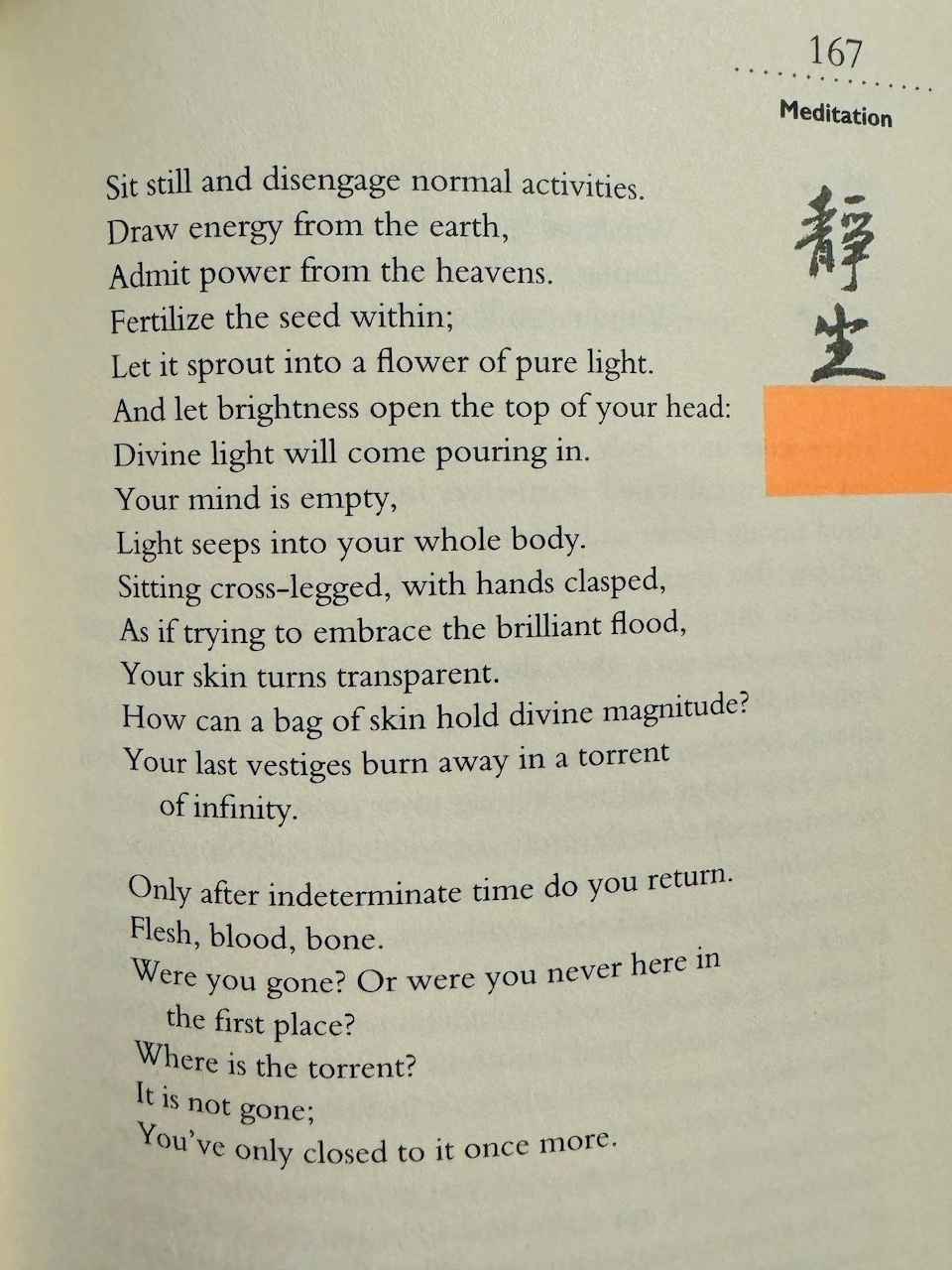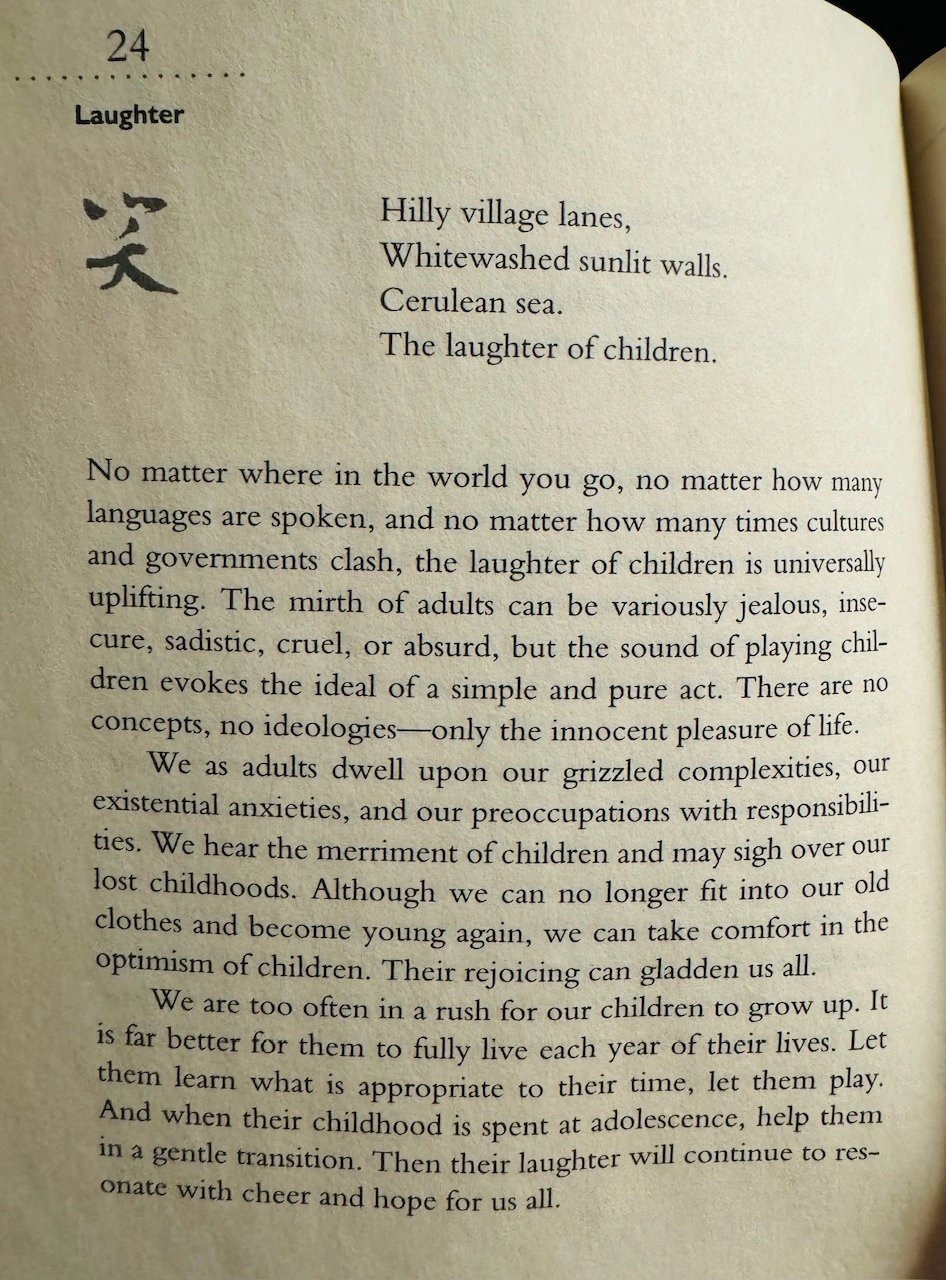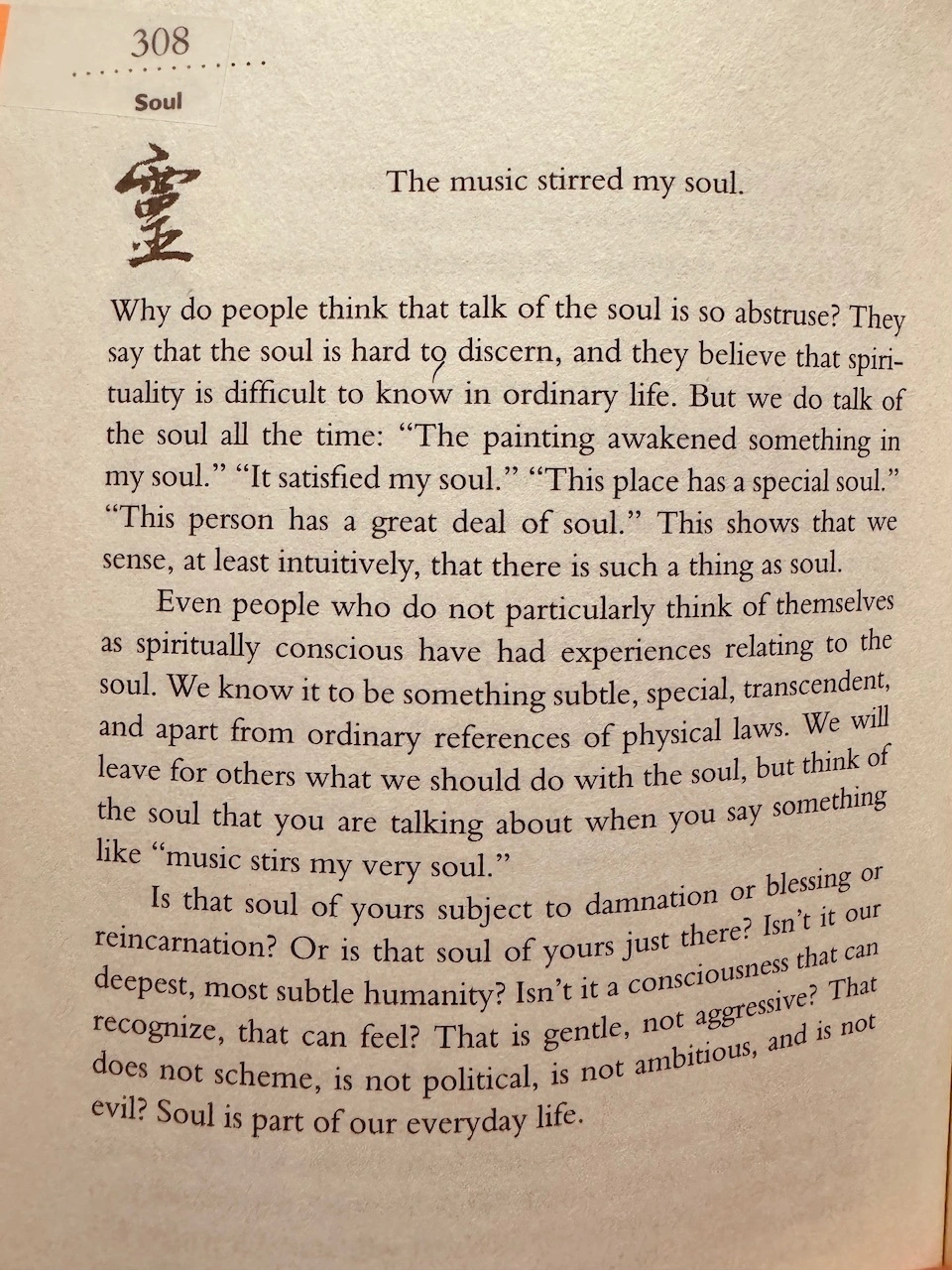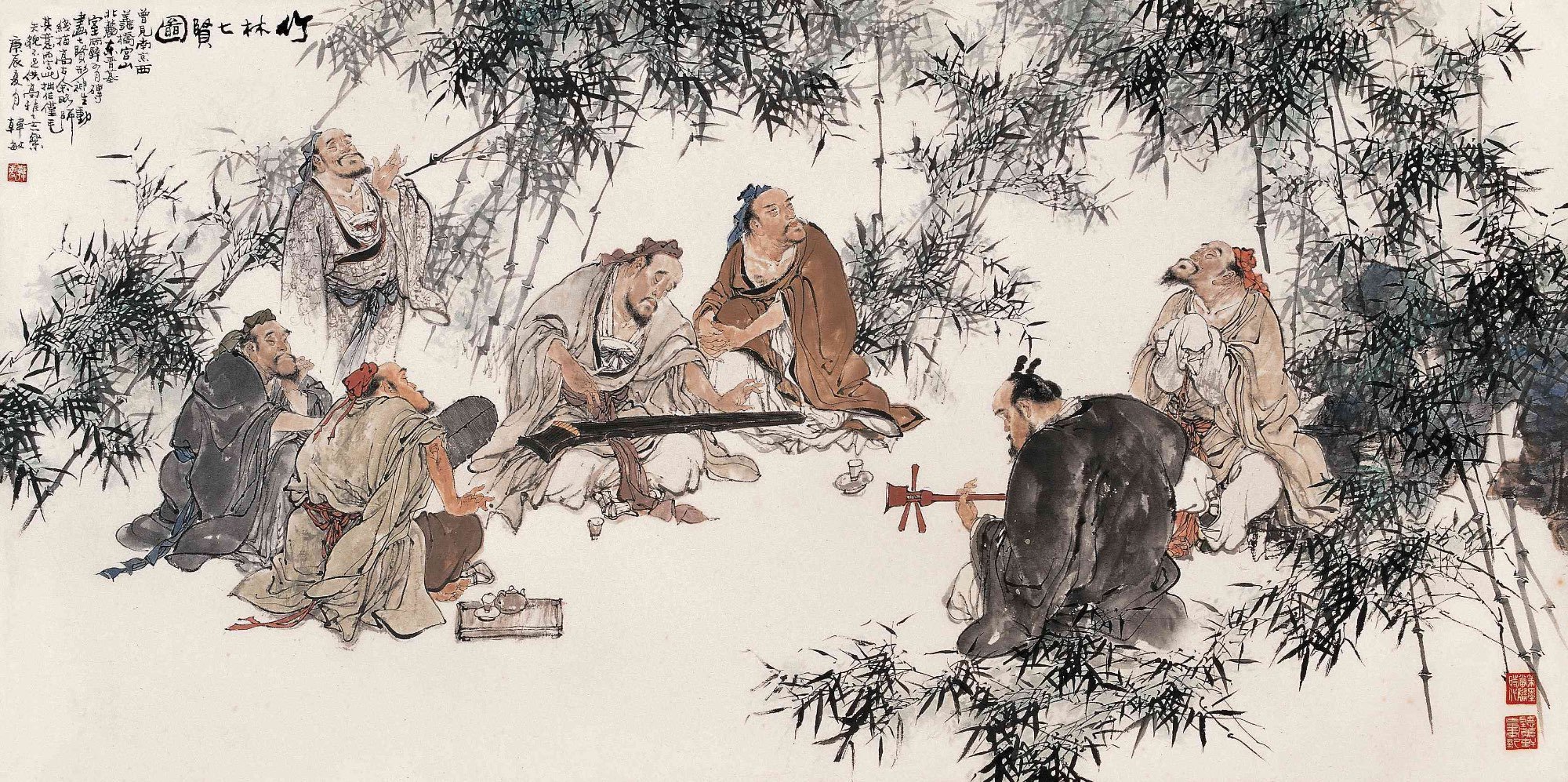
-
Day 148 'Translation'


148
Translation
Place the word Tao
Into your heart.
Use no other words.
Why do so many people seek foreign religions? Why are so many of our philosophies translations from other languages?
Surely we are all human beings, with hearts and minds, two hands and two legs. Each of us needs spirituality, but why must we always look abroad?
People who investigate Tao ask whether they have to be Chinese to benefit from it. It is true that part of the study of Tao is strictly Chinese. It is also true that this Taoism has never been exported unlike Buddhism, Islam, Hinduism, Chris-tianity, or Judaism—and has never been preached beyond the Five Sacred Mountains of China. It is elitist, to protect itself from coarse unbelievers. But this Taoism is not the Tao you need.
The true Tao is of no nationality, no religion. It is far beyond the conceptions of even the most brilliant human being, so it cannot be the property of one race or culture. The need to understand Tao is universal; people just give it different names in their native languages. Tao is the very essence of life itself, so those who are alive always have the possibility of knowing Tao. It is meant to be found in the here and now, and it is within the grasp of any sincere seeker.
-
Day 132 "Recognition"


132
Recognition
Spokes on the heavenly wheel
Keep rotation constant.
Those who follow Tao believe that Tao progresses through phases. They apply this principle to all levels of their outlok, from cosmology to the stages of growth in a person's life. On the macrocosmic level, they point to the rotation of the stars as evidence of smooth progression. In a person's life, they recognize the stages of aging beginning with childhood and ending with death.
Each one of us must go from phase to phase in our devel-opment. If we stay too long in one stage, we will be warped or stunted in our growth. If we rush through a stage, then we will gain none of the rewards or learning experiences of that phase.
Subsequent growth will be thrown off-balance; we will either have to go back and make it up, or, in the cases of experiences that can never be repeated, lose out on them forever. The proper discerning of these transitions is essential.
As we go through our various stages in life, it is important to mark the shift from one stage to another. Recognition is very important. We must understand that we are leaving behind one part of life and entering another. Sometimes, we mark this with a rite of passage such as graduation or marriage.
At other times, it may be a personal declaration made privately:
Whatever the reason, it is important to know exactly when to sose one phase and when to open the next. That is why it is said that one counts the spokes on the heavenly wheel as It turns: It is the measure of our lives.
-
Day 102 Awareness


102
Awareness
Outer eyes
Cannot see themselves.
The inner eye
Is its own reflection.
When we look, we can see many things, but the eyes cannot see themselves without the help of a mirror. We are not used to introspection. Although the followers of Tao say to look within to gain self-awareness, we will be confused if we use the attitudes formed by looking with our eyes.
That is why it is important to make a clear distinction early on. Do not try to understand yourself with the attitudes of physical seeing. Look within using inner vision.
For centuries, people of many different cultures have referred to the "mind's eye," or the "inner eye," or the "third eye." These are all indications that there is a separate way of looking within. In meditation, it is important to discover and introspection. We must go beyond thought, go beyond visualization, go beyond imagination and actually open a part of the mind that most people leave dormant. This inner eye has a location, buried deep in the bran.
When it is opened, it is our way of receiving more subtle experiences than we receive in our physical states. Perhaps looking and seeing are misleading terms, after all. We don't necessarily "see" images through this inner eye: We gain direct awareness that is beyond the image.
-
Day 92 Accuracy 🎯

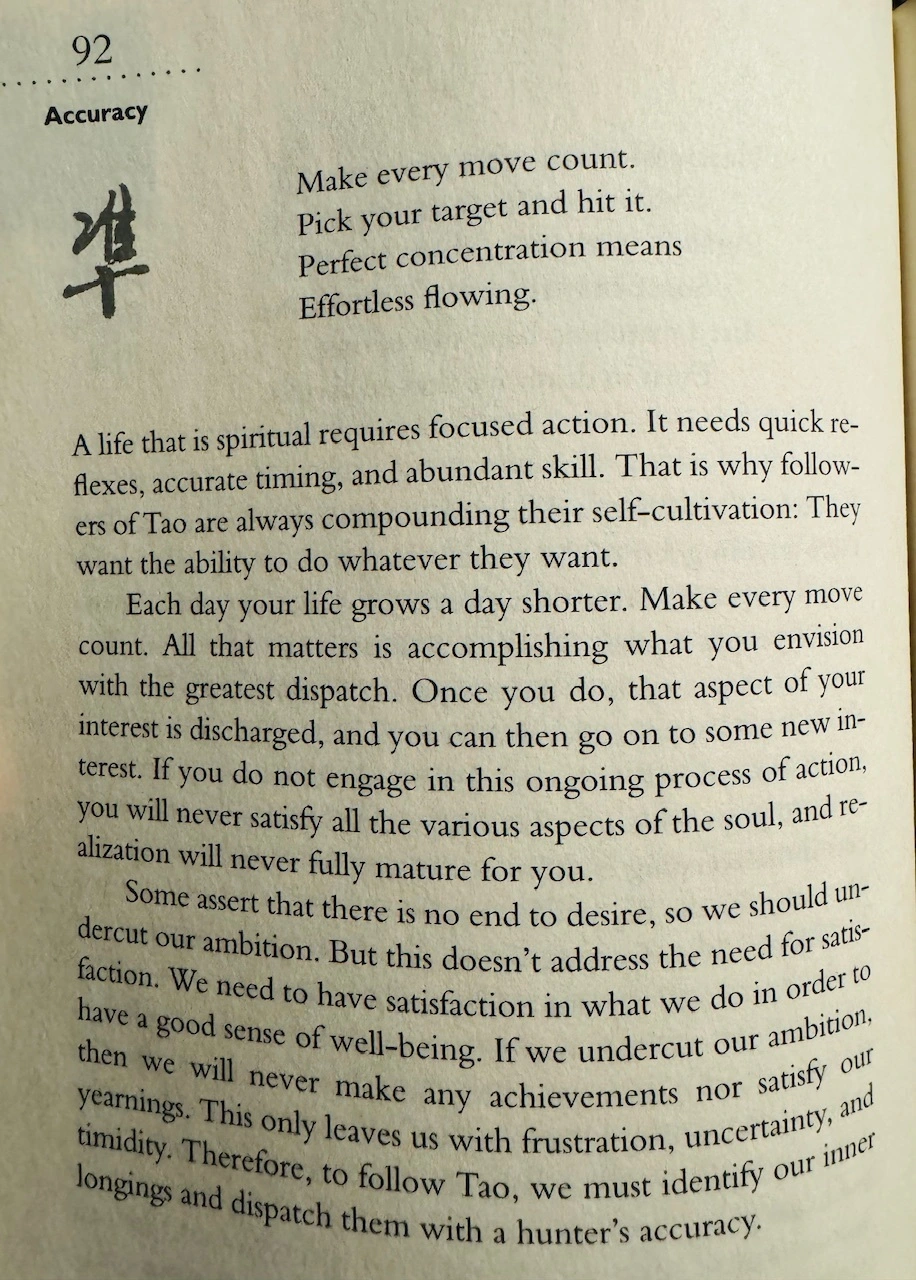
92
Accuracy
凖
Make every move count.
Pick your target and hit it.
Perfect concentration means
Effortless flowing.
A life that is spiritual requires focused action. It needs quick re-flexes, accurate timing, and abundant skill. That is why followers of Tao are always compounding their self-cultivation: They want the ability to do whatever they want.
Each day your life grows a day shorter. Make every move count. All that matters is accomplishing what you envision with the greatest dispatch. Once you do, that aspect of your interest is discharged, and you can then go on to some new in-terest. If you do not engage in this ongoing process of action, you will never satisfy all the various aspects of the soul, and realization will never fully mature for you.
Some assert that there is no end to desire, so we should undercut our ambition. But this doesn't address the need for satis-faction. We need to have satisfaction in what we do in order to have a good sense of well-being. If we undercut our ambition. then we will never make any achievements nor satisfy out carings. This only leaves us it fiestation, uncertainty, and tonging Therefore, to follow Tao, we must identify our incr longings and dispatch them with a hunter's accuracy.
-
Day 65 'Ascent'


65 Ascent Chill morning, stone steps. The path to the temple is steep. We may stumble at times, But we must always get up again.
Spiritual cultivation is a daily activity. No matter how much we achieve one day, we must continue the next. Progress is often so subtle that we may feel the effort futile, and it is hard to get up each morning and try again with the same enthusi-asm. Yet this is precisely what we must do.
If we have the benefit of guidance, talent, and the proper circumstances, then the bulk of our attention has to be paid to such a simple day-to-day effort. No person ever leapt to heaven in one bound. Spirituality is achieved by steady climbing, like a difficult journey to a mountain temple. The number of steps is in the thousands; the way is steep. It takes a long time to get there, and we must content ourselves with the panoramas along the way and think that the view at the summit will be best of all. If we fall, we must pick ourselves up and get back on the trail again.
Success in spiritual life is measured not by spectacular events but by daily devotion. This iron will, this deep sincenty maintains our ascent.
-
Day 62 'Interpretation'


62 Interpretation
All that we experience is subjective. There is no sensation without interpretation. We create the world and ourselves; Only when we stop do we see the truth.
The world exists, but we cannot truly be one with it in our normal modes of consciousness. Our minds know the world by constructing conclusions from the data of our senses. All that we know is filtered and interpreted.
Therefore, there is no such thing as objectivity or direct knowledge of the world. Everything is relative because we are each condemned to our particular vantage points. As long as we all have different perspectives, as long as perception relies on our senses, then there cannot be an absolute truth. All knowledge from experience, valuable as it may be, is imperfect and merely provisional.
Inner truth is only glimpsed by disconnecting the mechanism of interpretation. If we can withdraw the activities of the senses and isolate that part of the mind responsible for filtering sensory input, then we can temporarily shut off the ongoing process of interaction with the outside world. We will then be in a neutral place that is wholly turned inward. We are left with an absolute state, entirely without distinction or relativity. This is called nothingness and it is the truth underlying all things.
-
Day 59 Source


Wellspring of energy Rises in the body's core Tap it and be sustained. Channel it, and it will speak. 59 Source 源 The source of all power is within yourself. Although external circumstances may occasionally hamper you, true movement comes solely from within yourself. The source is latent in everyone, but anyone can learn to tap it. When this happens, power rises like a shimmering well through the center of your body.
Physically, it will sustain and nourish you. But it can do many other things as well. It can give you gifts ranging from unusual knowledge to simple tranquility. It all depends on how you choose to direct your energies. We cannot say that a person will become enlightened solely by virtue of having tapped this source of power; energy is neutral. It requires experience, wisdom, and education to direct it. You may gain power from your meditations, but it is possible for two people with the same valid attainment to use it in two different ways, even to the extremes of good and evil. Finding the source of spiritual power is a great joy; deciding how to direct it is the greatest of responsibilities.
-
Day 58 Opportunity


58 Opportunity 機会 A green bird darting in the night. Will you be able to see it? Will you be able to catch it?
Cling to Tao like a shadow. Move without a shadow.
Times of oppression and adversity cannot last forever. How is the transition made to new and better situations? In the midst of great difficulty, a tiny opportunity will open, if only by chance. You must be sharp enough to discern it, quick enough to catch it, and determined enough to do something with it. If you let it pass, you will be filled with regrets.
Stick to Tao like a shadow. Wherever it goes, you go. As soon as it throws something your way, catch it by sheer reflex. It is like the bird: If you try to catch it, you will miss. If you are always with it, moving at its speed, as much a part of it as its own shadow, then it is easy to seize it.
When you act, however, you in turn must have no shadow. In other words, what you do must leave no messiness, no leftover consequences, nothing that will haunt you later. That is one of the ways in which you avoid creating more bad situations for yourself: Your every movement is traceless.
-
Day 49 'Death'


49
Death Death is The opposite Of time.
We give death metaphors. We cloak it in meaning and make up stories about what will happen to us, but we don't really know. When a person dies, we cannot see beyond the corpse. We speculate on reincarnation or talk in terms of eternity. But death is opaque to us, a mystery. In its realm, time ceases to have meaning. All laws of physics become irrelevant. Death is the opposite of time.
What dies? Is anything actually destroyed? Certainly not the body, which falls into its constituent parts of water and chemicals. That is mere transformation, not destruction. What of the mind? Does it cease to function, or does it make a transition to another existence? We don't know for sure, and few can come up with anything conclusive.
What dies? Nothing of the person dies in the sense that the constituent parts are totally blasted from all existence. What dies is merely the identity, the identification of a collection of parts that we called a person. Each one of us is a role, like some shaman wearing layers of robes with innumerable fetishes of meaning. Only the clothes and decoration fall. What dies is only our human meaning. There is stil someone naked under neath. Once we understand who that someone is, death no longer bothers us. Nor does time.
-
Day 45 Circulation


45 Circulation 调息
Spirituality begins in the loins, Ascends up the back, And returns to the navel.
Spirituality is not just mental activity. It is also an expression of energy.
The source of this energy is physical, rooted in the basic chemistry of the body. Self-cultivation refines this energy for spiritual attainment. Enlightenment, for a follower of Tao, is therefore a psycho-physical achievement: It is a state of being rather than mere intellectual understanding.
Once the energy is awakened through special exercises and meditations, the follower of Tao knows how to draw this energy upward. The force begins from the genitals and rises up the spine. On its way, it nourishes the kidneys, nerves, and blood vessels. When it passes the base of the skull, the nervous system and the lower parts of the brain are stimulated. Reaching the crown, this river of energy opens the entire subconscious potential of a human being. Descending downward, it nourishes the eyes, the senses, the vital organs. Cascading toward the navel, it returns us to our original state of punity. From there, it returns to the loins again, ready to be drawn into another circuit. Just as all existence operates on a continuum between gross physical matter and the most subde levels of consciousness, so too does the follower of Tao utilize all parts of body, mind, and spirit for spiritual devotion.
-
Day 44 Stretching


44 Stretching 展
When young, things are soft. When old, things are brittle.
Stretching-both literally and metaphorically— is a necessary part of life.
Physically, a good program of stretching emphasizes all parts of the body. You loosen the joints and tendons first, so that subsequent movements will not hurt. Then methodically stretch the body, beginning with the larger muscle groups such as the legs and back, and proceed to finer and smaller parts like the fingers. Coordinate stretching with breathing; use long and gentle stretches rather than bouncing ones. When you stretch in one direction, always be sure to stretch in the opposite direction as well. If you follow this procedure, your flexibility will undoubtedly increase.
Metaphorical stretching leads to expansion and flexibility in personal growth. A young plant is tender and pliant. An older one is stiff, woody, and vulnerable to breaking. Softness is thus equated with life, hardness with death. The more flexible you are, the greater your mental and physical health.
-
Day 37 Discord


37 Discord
失调
When birds fly too high, They sing out of tune.
There are times when we feel out of harmony with our sur-roundings, matters do not go our way, and we feel confused and disoriented. Sometimes these moments will last a day, sometimes they may last for weeks. When we feel like this, we are not integrated with the Tao, or as it is sometimes metaphorically said, Tao has flowed elsewhere.
Being constantly in touch with Tao is an ideal. There will be times of misfortune and discord from external sources. We can also fall out of synchronization with Tao through our own follies, as when we act without complete consideration. Whenever this happens, we are like the birds singing out of tune: We are mired in discord.
If we keep our patience, we can usually ride out these times. We should take action and break the stagnation if an opportunity presents itself. Whether it is waiting or acting, we should always try to bring a situation back into balance so that we can rejoin Tao.
Whenever we find ourselves linked again, we will feel re-lieved. We are back on track, back on target. But we should learn from each time that we lose Tao. Sometimes this is enough to prevent reoccurrences, and sometimes it is enough to buoy our hopes through future lean times. Once we know the Tao, we will recognize it again and again. We will not lose faith, even in times of discord.
-
Day 26 Adoration


26 Adoration
Images on the altar, Or imagined within: We pray to them, But do they answer? The wise tell us how important adoration is. So we kneel before altars, give offerings, and make sacrifices. In our medita-tions, we are taught to see gods within ourselves and to make supplications to receive power and knowledge. This we do with great sincerity, until the masters say that there are no gods. Then we are confused.
The statue on the altar is mere wood and gold leaf, but our need to be reverent is real. The god within may be nothing but visualization, but our need for concentration is real. The attributes of heaven are utopian conjectures, but the essence of these parables is real. The gods, then, represent certain philosophies and extraordinary facets of the human mind. When we devote ourselves to gods, we establish communion with these deeper aspects.
The thought that we are worshiping symbolism may make us uncomfortable. We are educated to accept only the tangi-ble, the scientific, and the material. We doubt the efficacy of adoring the merely symbolic, and we are confused when such reverence brings about genuine personal transformation. But worship does affect our feelings and thoughts. When the wise say that there are no gods, they mean that the key to understanding all things is within ourselves. External worship is merely a means to point within to the true source of salvation.
-
Day 5 Sound

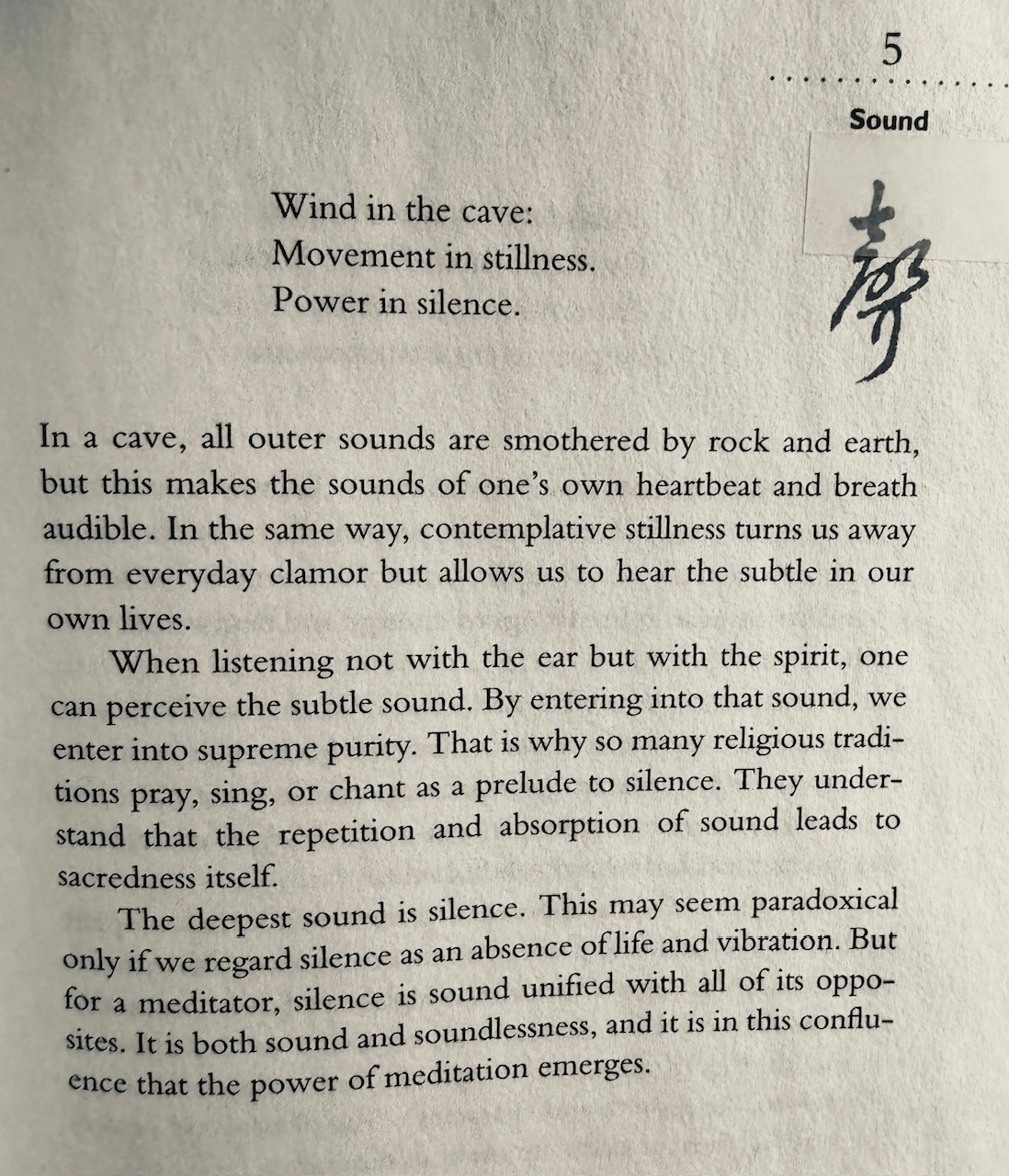
5 Sound
Wind in the cave: Movement in stillness. Power in silence.
In a cave, all outer sounds are smothered by rock and earth, but this makes the sounds of one's own heartbeat and breath audible. In the same way, contemplative stillness turns us away from everyday clamor but allows us to hear the subtle in our own lives.
When listening not with the ear but with the spirit, one can perceive the subtle sound. By entering into that sound, we enter into supreme purity. That is why so many religious traditions pray, sing, or chant as a prelude to silence. They understand that the repetition and absorption of sound leads to sacredness itself.
The deepest sound is silence. This may seem paradoxical only if we regard silence as an absence of life and vibration. But for a meditator, silence is sound unified with all of its oppo-sites. It is both sound and soundlessness, and it is in this confluence that the power of meditation emerges.
-
Another Way to Read Laozi
pixelfed.social 张殿李 (@[email protected])There are two reasons why we know so much about ancient #China. First, the #Chinese have been obsessive record keepers for most of their history. Second, said records were written on bamboo slats (like overlong bamboo Popsicle sticks), painted on with brush and ink in vertical lines of characters,...

As someone commented on the post: Tradition and Lasers.
-
Day 4 Reflection

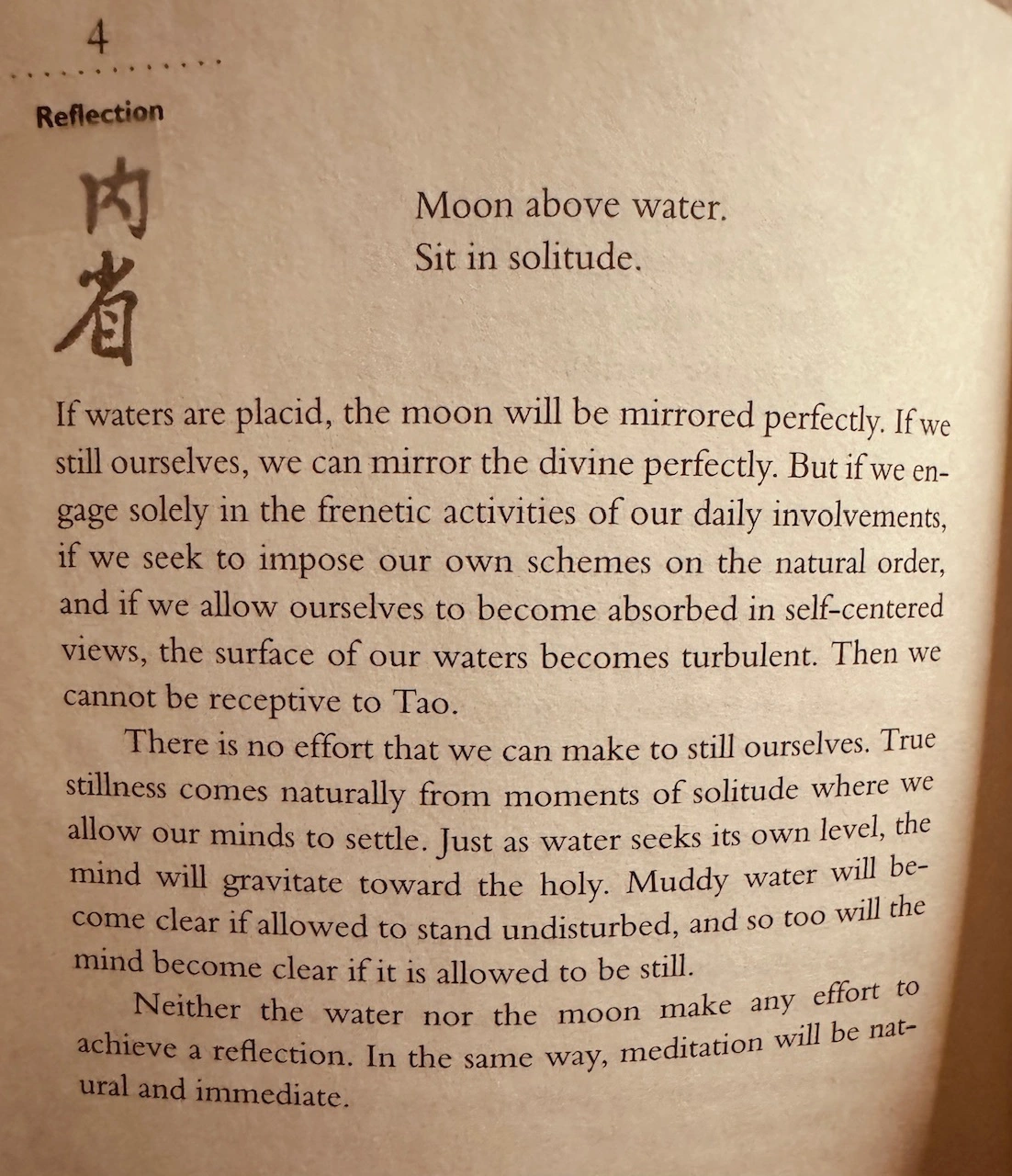
4 Reflection 肉省 Moon above water. Sit in solitude.
If waters are placid, the moon will be mirrored perfectly. If we still ourselves, we can mirror the divine perfectly. But if we engage solely in the frenetic activities of our daily involvements, if we seek to impose our own schemes on the natural order, and if we allow ourselves to become absorbed in self-centered views, the surface of our waters becomes turbulent. Then we cannot be receptive to Tao.
There is no effort that we can make to still ourselves. True stillness comes naturally from moments of solitude where we allow our minds to settle. Just as water seeks its own level, the mind will gravitate toward the holy. Muddy water will become clear if allowed to stand undisturbed, and so too will the mind become clear if it is allowed to be still.
Neither the water nor the moon make any effort to achieve a reflection. In the same way, meditation will be natural and immediate.
-
Day 365 Continuation

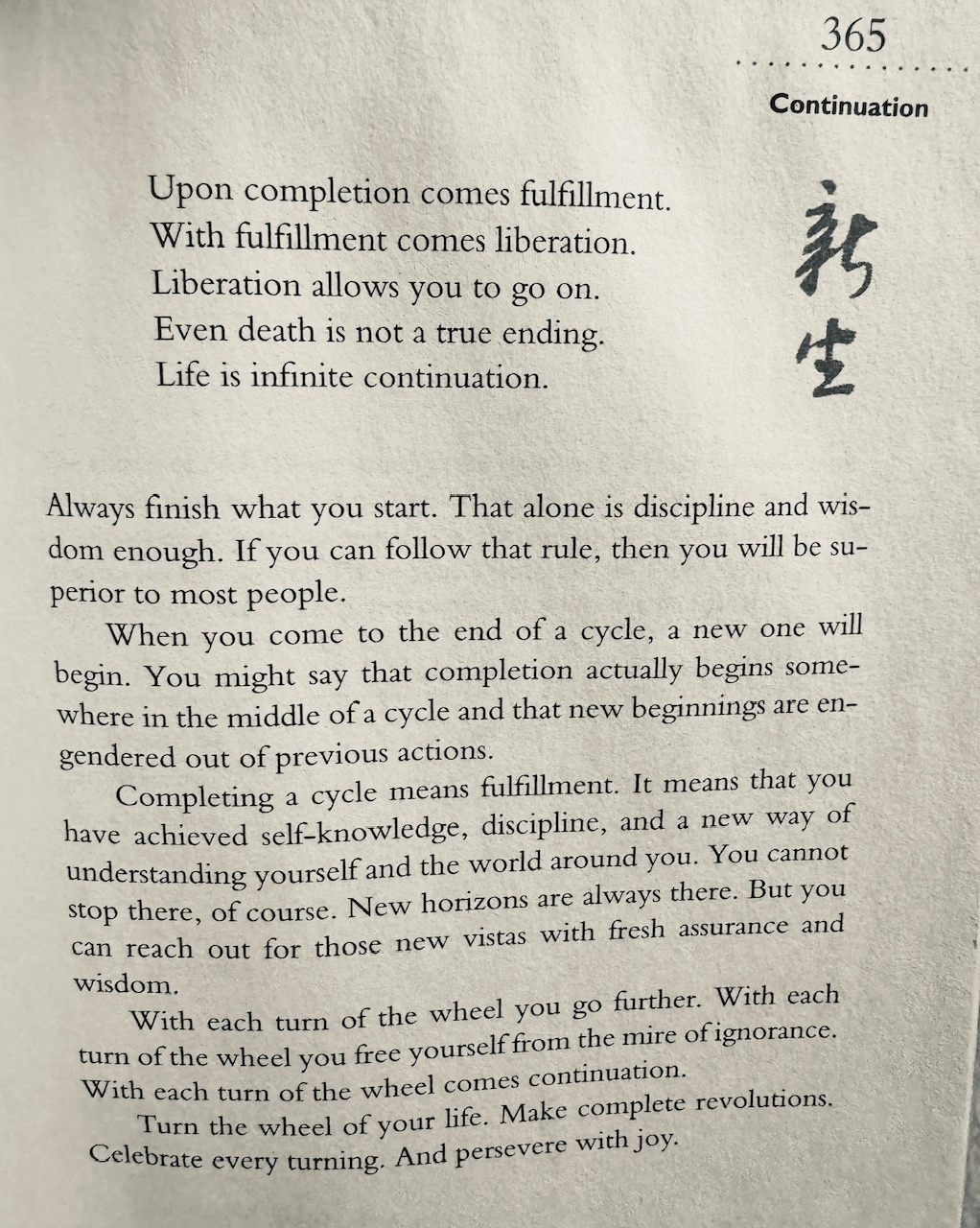
365 Continuation Upon completion comes fulfillment. With fulfillment comes liberation. Liberation allows you to go on. Even death is not a true ending. Life is infinite continuation. 彩生
Always finish what you start. That alone is discipline and wisdom enough. If you can follow that rule, then you will be superior to most people.
When you come to the end of a cycle, a new one will begin. You might say that completion actually begins somewhere in the middle of a cycle and that new beginnings are engendered out of previous actions.
Completing a cycle means fulfillment. It means that you have achieved self-knowledge, discipline, and a new way of understanding yourself and the world around you. You cannot stop there, of course. New horizons are always there. But you can reach out for those new vistas with fresh assurance and wisdom.
With each turn of the wheel you go further. With each turn of the wheel you free yourself from the mire of ignorance. With each turn of the wheel comes continuation.
Turn the wheel of your life. Make complete revolutions. Celebrate every turning. And persevere with joy.
-
Day 363 "Night"


363 Night
In night's vast ocean, Sun, moon, and earth align, Pulling the earth out of roundness And making tides rage. Such is the power of night.
Night. You are mother of all. You existed before all. You are the background, the fabric, the whole underpinning of the universe.
In you is abstruse mystery, darker than the deepest water, blacker than the sleep of sleeps. You are an inconceivable fer-tility, a wild and uncontrollable realm from which strangeness and power and creativity and mutation and life spring. The miracle of birth comes from you. And the horror of death. That is why you both comfort and frighten us.
Stars and planets are scattered through you like luminescent pearls. You string them on your current effortlessly, and the pull of syzygy is so tremendous that the birth shape of the earth is pulled out of roundness, the seas exceed their brims, and the heads and hearts of all the creatures on this planet are made to pound and wonder in dazzled confusion.
When stars and novas burst, energy untold is unleashed— explosions of such magnitude that human intellect and instruments could never hope to measure even if made superior by a hundredfold-and yet these flames burn out, sputter, become mere dim coals in the supreme expanse that is night.
Night. You are mother without a mother. You are mystery and power and ruler of all time.
-
Day 355 Winter


355 Winter A homeless man dies in the gutter. A tree cracks in the cold: A shocking sound.
At the winter solstice, the day is shortest of all and night is longest. It can also be the time of bitter cold. The wind blows with a frigid ferocity, cutting all before it. Snow and ice become deadly. Those who are homeless die of exposure. Even the mightiest of trees can split from the drop in temperature. The sound of a tree snapping is a sudden slap.
The horrors, the tragedies that this nadir brings! Winter tortures the world with icy whips, and those who are weak are ground beneath its glacial heels. Sometimes, we dare not even lament those who die in the onslaught of winter, in fear that the tears will freeze upon our faces. But we see, and hear. Huddling closer to the fire, we vow to survive.
No matter how affected we are by misfortune, we must remember that this is the lowest turn of the wheel. Things cannot forever go downward. There are limits to everything— even the cold, and the darkness, and the wind, and the dying.
They call this the first day of winter, but actually it is the beginning of winter's death. From this day on, we can look forward to warming and brightening.
-
Day 348 Spine


348 Spine Tao is the road up your spine. Tao is the road of your life. Tao is the road of the cosmos. People are often confused about Tao because there are references to it on so many different levels. After all, it permeates all existence. Indeed it might be said that Tao is existence itself. It might seem odd that we can talk about Tao on a level so mundane as physical exercise and on a level as exalted as holiness itself. Those who follow Tao do not think of divinity as something "up there." They think of it as everywhere.
Tao can be tangible when it wants and intangible when it wants too. One tangible aspect of Tao is the road in the very center of our spines. That is the path of Tao in us. It is the spirit road connecting the various power centers of our bodies.
On a philosophical level, Tao is the road through life. It is the change from one stage to another, the dealing with cir-cumstances, the expression of your inner character against the background of nature and society. On a metaphysical level, it is the evolution and movement of the cosmos itself.
Now take these three levels the movement of energy up the spine, the philosophical understanding of one's own path in fe, and the very progression of the universe and meld them all into one co prones concept. Then you will have a glimpse of the genius of Tao.
-
Day 336 "Wisdom"

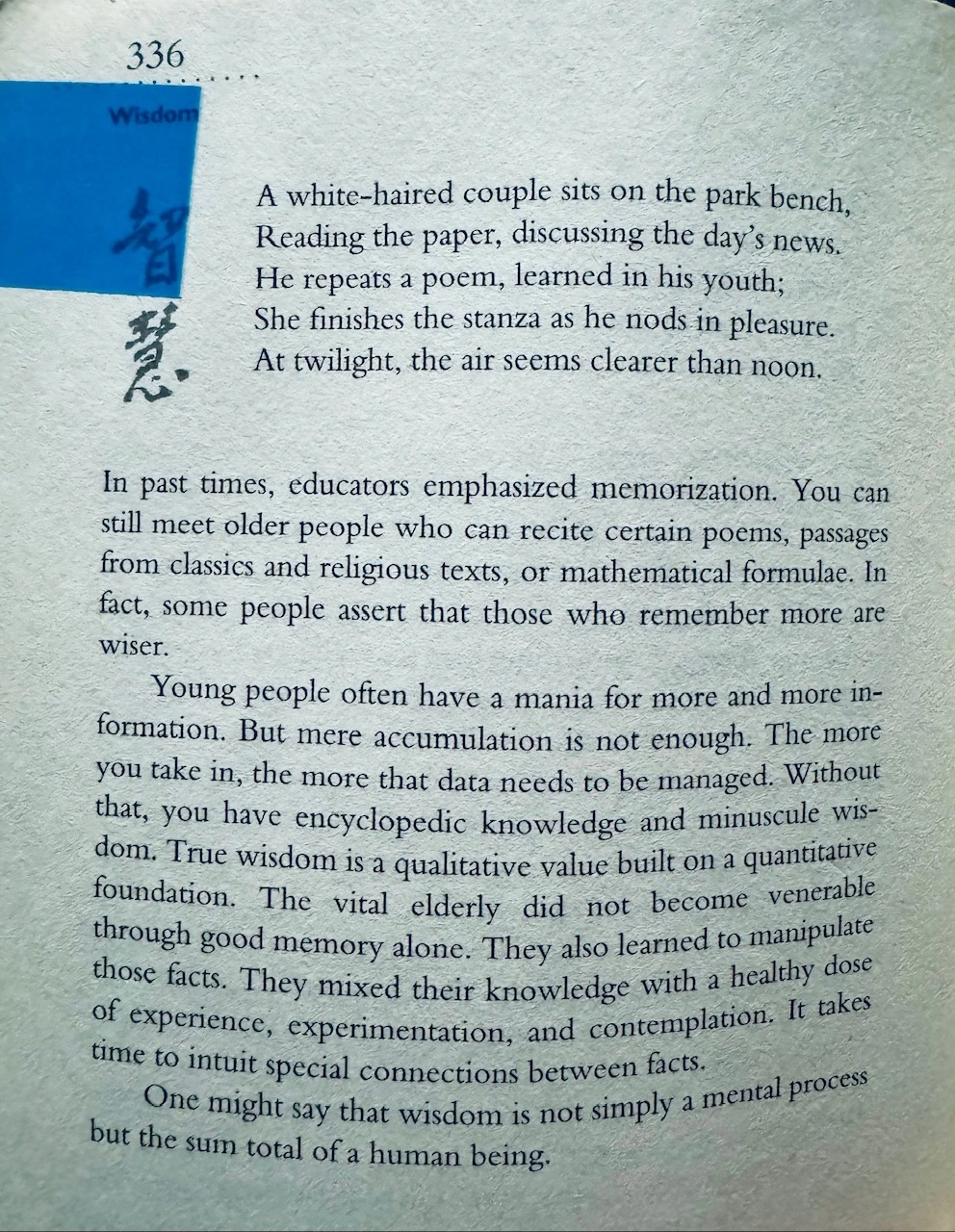
336 Wisdom 智慧 A white-haired couple sits on the park bench, Reading the paper, discussing the day's news. He repeats a poem, learned in his youth; She finishes the stanza as he nods in pleasure. At twilight, the air seems clearer than noon. In past times, educators emphasized memorization. You can still meet older people who can recite certain poems, passages from classics and religious texts, or mathematical formulae. In fact, some people assert that those who remember more are wiser. Young people often have a mania for more and more information. But mere accumulation is not enough. The more you take in, the more that data needs to be managed. Without that, you have encyclopedic knowledge and minuscule wisdom. True wisdom is a qualitative value built on a quantitative foundation. The vital elderly did not become venerable through good memory alone. They also learned to manipulate those facts. They mixed their knowledge with a healthy dose of experience, experimentation, and contemplation. It takes time to intuit special connections between facts. One might say that wisdom is not simply a mental process but the sum total of a human being.
-
Day 335 "Prowess"

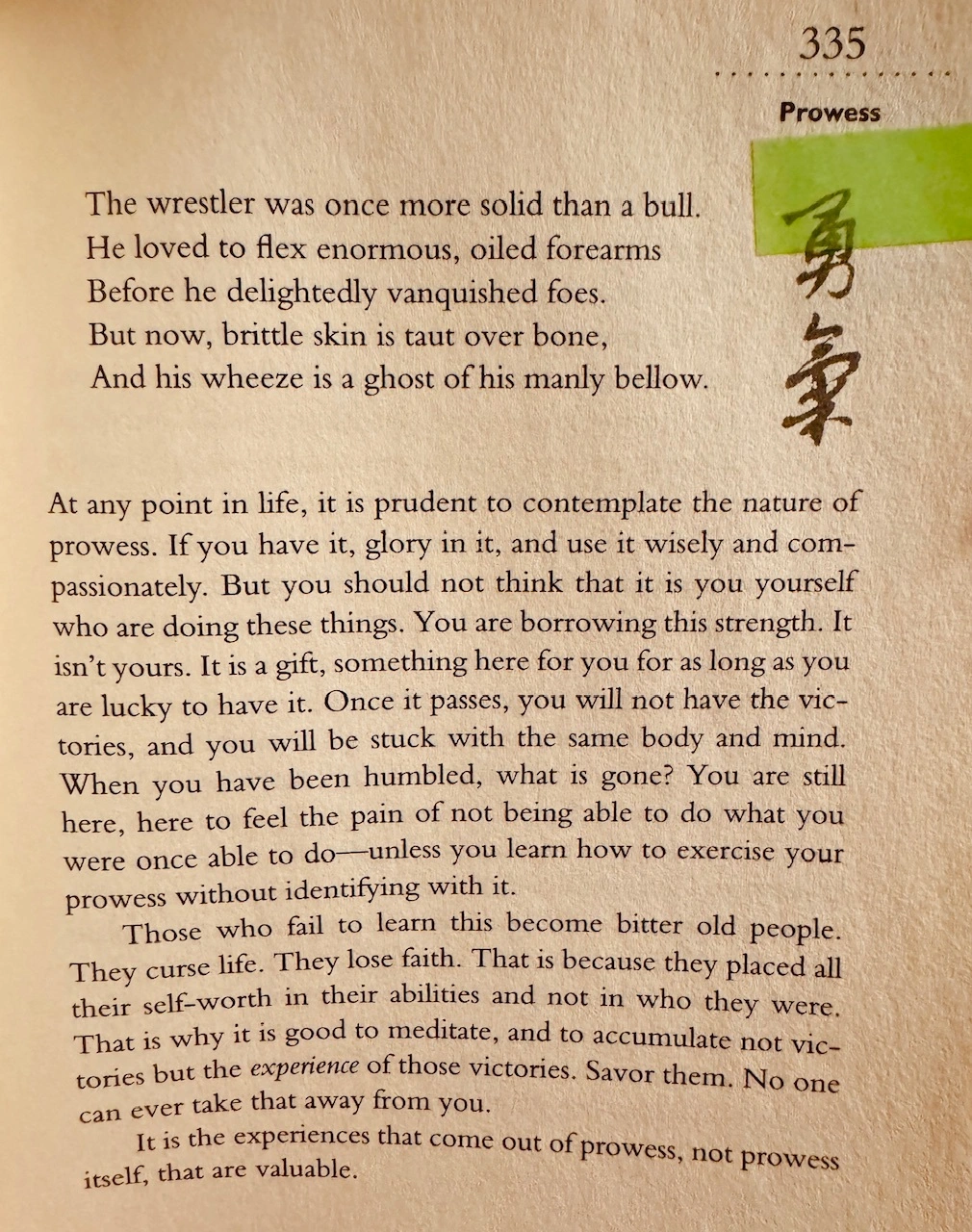
335 Prowess The wrestler was once more solid than a bull. He loved to flex enormous, oiled forearms Before he delightedly vanquished foes. But now, brittle skin is taut over bone, And his wheeze is a ghost of his manly bellow. 勇氣 At any point in life, it is prudent to contemplate the nature of prowess. If you have it, glory in it, and use it wisely and com-passionately. But you should not think that it is you yourself who are doing these things. You are borrowing this strength. It isn't yours. It is a gift, something here for you for as long as you are lucky to have it. Once it passes, you will not have the vic-tories, and you will be stuck with the same body and mind. When you have been humbled, what is gone? You are still here, here to feel the pain of not being able to do what you were once able to do—unless you learn how to exercise your prowess without identifying with it. Those who fail to learn this become bitter old people. They curse life. They lose faith. That is because they placed all their self-worth in their abilities and not in who they were. That is why it is good to meditate, and to accumulate not victories but the experience of those victories. Savor them. No one can ever take that away from you. It is the experiences that come out of prowess, not prowess itself, that are valuable.
-
The Laozi in the Context of Pre-Qin Chinese Philosophy
From professor Tao Jiang at Rutgers University:
"I want to do a quick thread on the Laozi I’m presenting this afternoon at EPHE in Paris in case anyone is interested. The Laozi I’m presenting was not a “Daoist,” a later term anachronistically applied to earlier texts like the Laozi and the Zhuangzi.
Altho not all anachronisms are problematic, at least not in the same way (e.g., fajia isn't too bad), using “Daoism” to lump together the Lz and the Zz in the context of pre-Qin Chinese intellectual history obscures the vast difference between their moral-political projects.
The Lz was actively engaged in the mainstream debate about humaneness vs. justice as the governing norm of an imagined new moral-political order and was pivotal in shaping the moral-political discourse in late Warring States, e.g., Zhuangzi, Xunzi, and fajia thinkers, esp. HF.
On the other hand, the Zhuangzi was a much more marginal text whose main intellectual pulse was the imagination and pursuit of personal freedom. “Daoism” in later Chinese history has a rather different story and ethos.
There're two clusters of ideas in the Laozi: moral-political and cosmogonic-mystical, but what is their relationship? A.C. Graham famously asks, “Can it really be advising rulers that to govern their states requires nothing less than the ultimate mystical illumination?”
Excavated texts reveal that the “mystical” or cosmogonic elements in the Laozi represented a major voice in the philosophical speculations about the origin of the cosmos and the Laozi was a part of the “naturalist turn” in classical Chinese philosophy in late 4th century BCE.
To answer Graham’s question, it's not so much that rulers’ mystical vision of the cosmos would necessarily offer them personal insights into effective governance. Rather, the more historically compelling read on the significance of the mystical-cosmogonic aspect of the text is that it signaled a new understanding of the nature of the cosmos, as well as a broad reorientation in the Heaven-human relationship in the mid-Warring States period. This would set the stage for the most consequential development in Chinese political history, namely the drastic bureaucratization and naturalization of the state with impartiality enshrined as the political norm for the state in the hands of the fajia thinkers. Within the naturalist vision of the cosmos, Laozi would completely reject the idea that Heaven, which was now a part of the Dao-generated cosmos, cared about human well-being and was involved in managing human affairs. This change is most dramatically captured in Chapter 5 of the Laozi where he declares that “Heaven and Earth are not humane (bu ren 不仁)" & straw dogs.
I will then talk about wuwei/youwei as representing extraordinarily sophisticated metaethical critique of the mainstream moral-political project. In this regard, it is inconceivable that the Lz could have been composed in the same period as the Analects as some still believe.
Philosophically, the Lz is more sophisticated than the Analects by several order of magnitude. The Laozi was an extraordinarily influential text in that its wuwei project both "failed" and "succeeded" spectacularly, often in the Nietzschean sense of transvaluation."
-
Help me identify a philosopher
One time I read a quote by a philosopher. I'm not sure if he was strictly Daoist, but at the very least Daoism-adjacent. IIRC correctly he wasn't one of those academic types, and more an ascetic sage type.
Anyway, I don't remember the exact quote, but the crux of it was that the Dao has no intention. It said something like "if the Dao had intention, it would only be like a shepherd". This shepherd analogy is the only specificity of this quote that I can remember. If you know who it was, please let me know.
-
Day 326 "Mysticism"


326 Mysticism 神秘
All mystical traditions are one. They are the seed of all religions.
Tao. Zen. Tantra. Yoga. Kabbalah. Sufi. Mystic Christianity. Shamanism. And so many more secretly treasured by their ad-herents. These all share the same mystical sense of communion with the divine. Meditation is not something peculiar to one culture.
All cultures know a mystical core that emphasizes continuing refinement, meditation, and unification with the greater cosmos. I call that greater order Tao. They call it by different names. What does it matter what people call it? When they discovered what was holy, they uttered different sounds according to their history and culture, but they all discovered the same thing. There is only one divine source in life.
For generations, mystics of all traditions have plunged into Tao. When they meet on the unutterable levels, they know without words that they have reached the same core of spiritu-ality. No matter where in the world you are, there are traditions with the purity to lead you to Tao.
-
Day 325 "Mate"


325 Mate Passion is but a prelude to Years of gradual unfolding. 夥 Some people mate for life. Perhaps their love affair starts with infatuation, passion, and eroticism. Eventually it gives way to a more stable companionship. Not all couples pass this transition period intact, but those who do find a new mode of relating to one another. Devoted lovers find that minor faults can be ac-cepted. At the same time, they find acceptance in spite of their own inherent shortcomings and insecurities.
Mature love is patient, selfless, generous, and kind. The lover becomes more important than the self. In love, we find transcendence and a unity that is unattainable alone.
Many sages speak out against romantic love. Can it be that they have never felt it or that they have been bitterly disappointed themselves? Individuals should know themselves well. If they are meant for love, they will know.
Ultimately, the other is divine and divinity dwells in the other. Through love, one can come to know the beauty of unity and wholeness. Without the female, the male element is static and sterile. Without the male element, the female is boundless potential without a catalyst. Through unification, we find selflessness, purity, and divinity.
-
Day 319 "Sustaining" 支撑

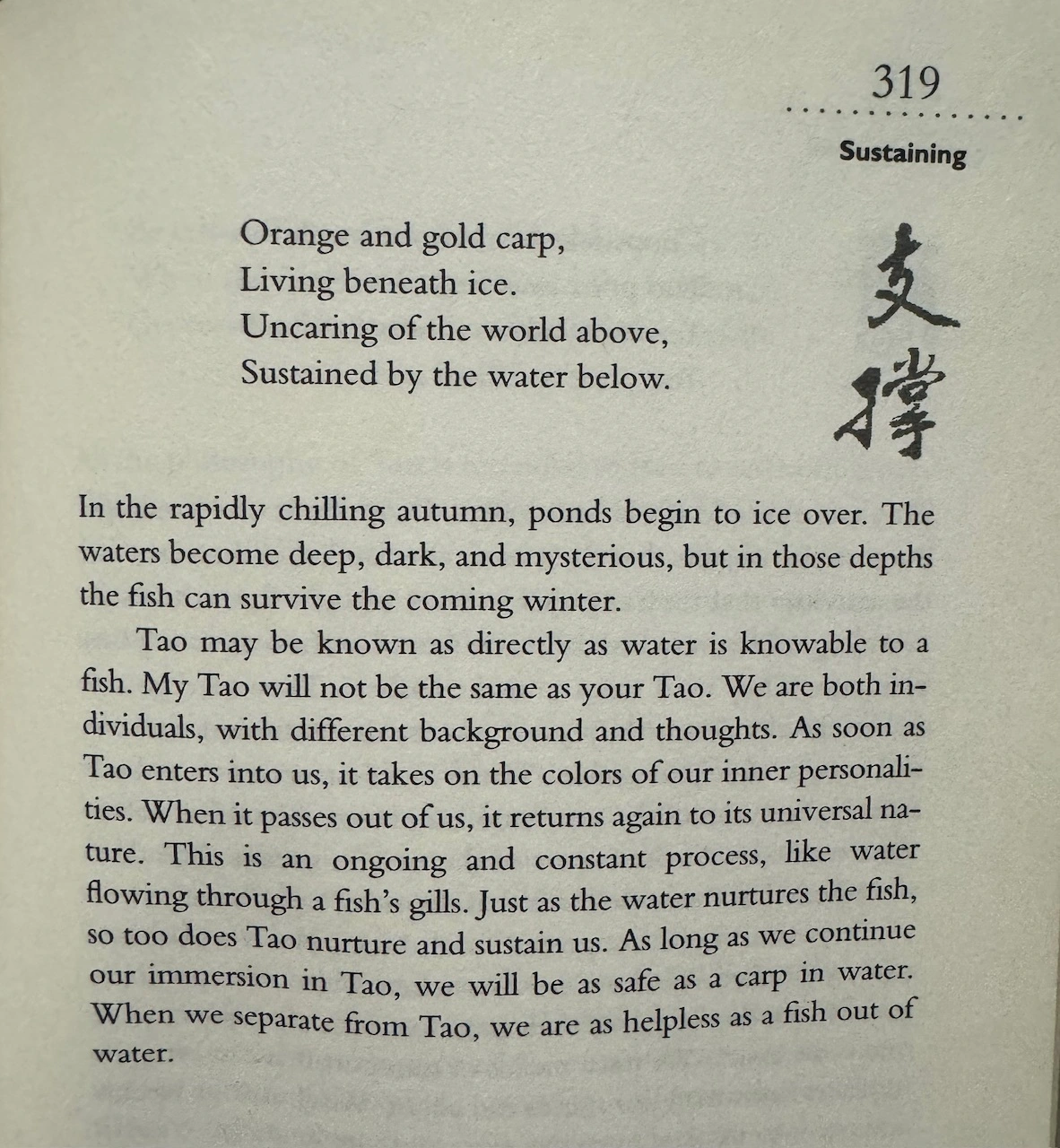
319 Sustaining 支撑 Orange and gold carp, Living beneath ice. Uncaring of the world above, Sustained by the water below.
In the rapidly chilling autumn, ponds begin to ice over. The waters become deep, dark, and mysterious, but in those depths the fish can survive the coming winter. Tao may be known as directly as water is knowable to a fish. My Tao will not be the same as your Tao. We are both in-dividuals, with different background and thoughts. As soon as Tao enters into us, it takes on the colors of our inner personali-ties. When it passes out of us, it returns again to its universal na-ture. This is an ongoing and constant process, like water fowing through a fish's gills. Just as the water nurtures the fish, so too does Tao nurture and sustain us. As long as we continue our immersion in Tao, we will be as safe as a carp in water. When we separate from Tao, we are as helpless as a fish out of Water.
-
Day 313 Chameleon


313 Chameleon If I don't want to be known, I cannot be known. The best actor can divide role from self. The best liar can divide truth from falsity. People think that they know you. Soon you begin to play the role that they place on you. Why should you act a certain way to please others? You should do things from your inner awareness and from your own feelings. If they do not accord with the herd, then so much the better. You should change when it pleases you. Your life is flexi-ble. If you let other people shape you, then you will never know independence. The sages say that all life is illusory, and they usually lament this. The way of Tao is to use this fact and not let it oppress you. If you want to dodge others, then step behind one of the myriad illusions in this world. If you do not volunteer anything and you neither confirm or deny, the opinions of others can never stick to you. Then you will be left in peace. True sages never go by appearances. When it comes to in-trospection, they are not deceived by the appearances their own minds spew out. They know that if they want to get at the truth, then they must pierce to the very core. So if you would hide from others, avail yourself of the false appearances of life, If you would know yourself, distinguish between the false appearances of life. Above all, do not be put off by the illusory nature of life. Use it. Everything in this life can be an advantage to the wise.
-
Day 305 "Being"


305 Being Meditation is a total state of being. 坐存 Many people do not understand meditation, and so they reject it. Even those who accept it sometimes understand it in only a fragmentary way. Some think of it as a relaxation exercise; others think of it as a mere spiritual cultism. Even the fact that meditation is an uncommon word in everyday language is un-fortunate, for it reinforces the view that it is something strange. Meditation is a state of being. It is a mode of existence. What is difficult to communicate is that meditation is an act that occurs simultaneously on all levels of a person's life. For example, let's take the proverbial "contemplating your navel." If this is done correctly, here are some of the things that can happen: increased digestion, better elimination of the bowels, increased sexual vigor along with enhanced control, greater vi-tality, improved circulation, increased appetite, stabilized emo-tions, calmer mind, understanding of deep spiritual truths, and total absorption in a blissful state of being. It is difficult for people to accept that a single activity could span a continuum from better bowel movements to spiritual bliss. But unless meditation was so extraordinary, how else could it be expected to occupy such an honored place in people's lives?



